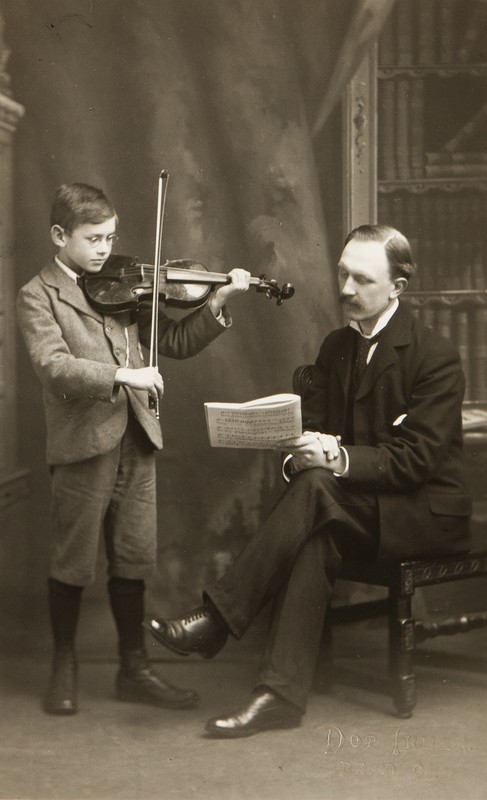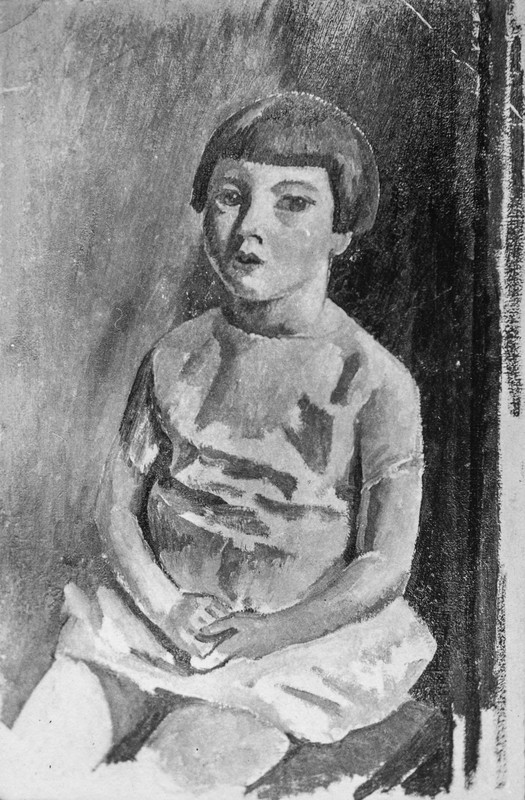The first concerts we went to were a strange mixed grill called 'International Celebrity Concerts'. The artists were mostly outworn operatic singers. Their voices may have been past their prime but their figures were formidable in the extreme. The ladies looked like wedding cakes and the men, corpulent and sweating in their shirtfronts, led the ladies, simpering like young girls.
What they sang was nobody's business and certainly had nothing to do with music. The programme, which was not published beforehand, would be enlivened a little by the introduction of a young and comparatively unknown instrumentalist whom the celebrities were condescendingly introducing to the public. But their musical ability could not be judged as they played only 'arrangements' or mostly dis-arrangements of works not intended for the instrument.
I remember one such concert in which Clara Butt and her husband, Kennedy Rumford, sang The Keys of Heaven back to back with grimaces and gestures between each verse. She of course sang Liddle's Abide With Me with organ and piano accompaniment. But something went wrong with the organ. She apologised for the delay and sat down on the piano stool with her pianist, Harold Crouton. Whether her contract forbade her to sing anything during this interlude I cannot say. She also trotted out some ditties such as A Fairy Went a-Marketing and then waited for the encores. The items were punctuated by the handing up of the most expensive-looking floral tributes, which the recipients received with feigned surprise and pleasure.
When there was an orchestral concert Mother went with Father alone. I was sometimes awake when they returned and I eagerly enquired of Mother what it had been like. She nearly always gave the same answer 'Very heavy!' The programmes must have been very unenterprising, as I found later that Father had never heard any of the Brahms Symphonies or any Beethoven except the Fifth. He described to me how he had attended the Halle concert on the night Sir Charles died, the rostrum being draped in black and the orchestra performing without a conductor. He also told me of a recital given by the great Anton Rubinstein and how a string in the piano began vibrating strangely. As a passage for the left hand only came along, he stretched over and with his right hand pulled the offending string right out of the case.
My interest must have been such that at last I was taken to a few orchestral concerts and heard Busoni play a Beethoven concerto. I remember that during the various lulls in the solo part he kept glaring at a luckless cellist in the orchestra whose performance did not meet with his approval.
There were some chamber concerts at the Mechanics' Institute. Father never went to them but I was fortunate to be taken to a few of these by my friends and I shall never forget hearing my first Haydn String Quartet there. Just the first few bars made me almost laugh or cry with joy, I don't know which.
Sir Hamilton Harty once came with solo members of the Halle Orchestra to play chamber music. The first item in the programme was one of the two sonatas for clarinet and piano by Brahms, but without any announcement being made, this item did not open the programme. The other quintets and trios were played and it was then that the audience realised why the Sonata had been postponed. A curtain covered the entrance and exit for the performers and it was from behind this that the audience observed Sir Hamilton propel the unfortunate clarinet player on to the platform. Directly this was achieved, four grinning heads appeared round the curtain one above the other, watching the progress of the clarinettist to his chair where he sat down heavily and proceeded to take his instrument to pieces. He smiled to himself, looked down the bell, wiped it with his handkerchief, put the parts back together again squinting along the keys to see if they were in line. During this performance Harty was seated at the piano watching his partner carefully, stroking the keys patiently. The clarinet appearing to be whole, its owner belched, and Harty, seizing the psychological moment, waded straight away into the first movement. His partner, a new man, played the work through like an angel. After that, Sir Hamilton, the sweat pouring down his face, put his arm through that of his fellow performer and escorted him to his exuberant mates behind the exit curtain to the enthusiastic cheers and applause of the delighted audience.
I always preferred music of a slow and dignified nature. My mind worked so slowly that I could not comprehend a rapid movement even by so lucid a composer as Mendelssohn. It was the same with speech; a rapidly spoken dialogue was utter confusion to me and became just a blur of sound. So the subsequent piano recitals which I went to with Father were almost meaningless to me, as so much was display of manual dexterity and the sharp hammering and cascades of notes could not be sorted out at a single hearing with anything that made sense. This led me to prefer an instrument like the organ, which really sustained a given note that on the piano was a sharp impact immediately dying away. Unaccompanied choral works, which were so rare a thing in those days, were a great revelation to me and I realised that here at last was a language I could really understand.
As I began to talk in my limited way about this discovery I found that Mother’s side of the family had a flourishing musical tradition. Great Uncle Jasper Snowdon was a bell ringer of repute and a treatise he wrote on the subject is still in use. His brothers were all musical and sang glees and madrigals. Mother's elder sister, Aunt Agnes, told me that she remembered them singing Orlando Gibbons' famous The Silver Swan. They played the organ and one of them used to take out his clarinet on the train on his way to business and practise, if there was no objection from his fellow passengers. So I was encouraged by finding that there was another very important branch of musical activity which was so closed to my Father with his Chopin playing, as Liszt and his followers were to me. The fireworks of violin playing meant nothing to me and I could hardly be persuaded to practise this instrument until I discovered Corelli and Handel. Their works justified acquiring only a limited technique.
I began to play the piano, not with a view to performing works for that instrument, but to get to know how such masterpieces as Handel's Messiah were put together.
Father disliked opera so, apart from Gilbert and Sullivan, we experienced very little music of this kind. So it came as a surprise to me when he booked seats for Carmen and Tannhauser for the week when the O'Mara Opera Company were visiting Bradford. I found it confusing. I watched the action and took great pleasure in seeing so many costumes on the stage but I forgot to listen to the music. But when I was a student at the School of Art a number of us booked seats when the Beecham Opera Company came, to see The Magic Flute and The Marriage of Figaro. Here at once everything was all of a piece; the overtures setting the pace and excitement from the start. The staging was simple and as delightful as the costumes. I was no judge of performance but I shall never forget it. When listening to either of these operas on the radio I always visualise them as I saw on-stage over thirty years ago.
The concert which crowned all concerts before I left Bradford I went to alone. Father would not or could not go and I tried in vain to find a companion. To have shared this with some kindred soul would have been bliss. The Sistine Choir sang Palestrina and Orlando Lassus to an almost empty hall but I had at least the evidence before me of the great music of which I had only felt the shadow.
Perhaps the culmination after the Second World War came with the radio performance under Michael Tippet's direction, of Tallis' magnificent forty part motet Spem in Alium. My wife was bathing our small daughter at the time and as choir upon choir built up this edifice of sound she was told to stop splashing and listen; and so the music filled the house and at length died way. 'Yes' she whispered 'That's what it's like in Heaven'.

